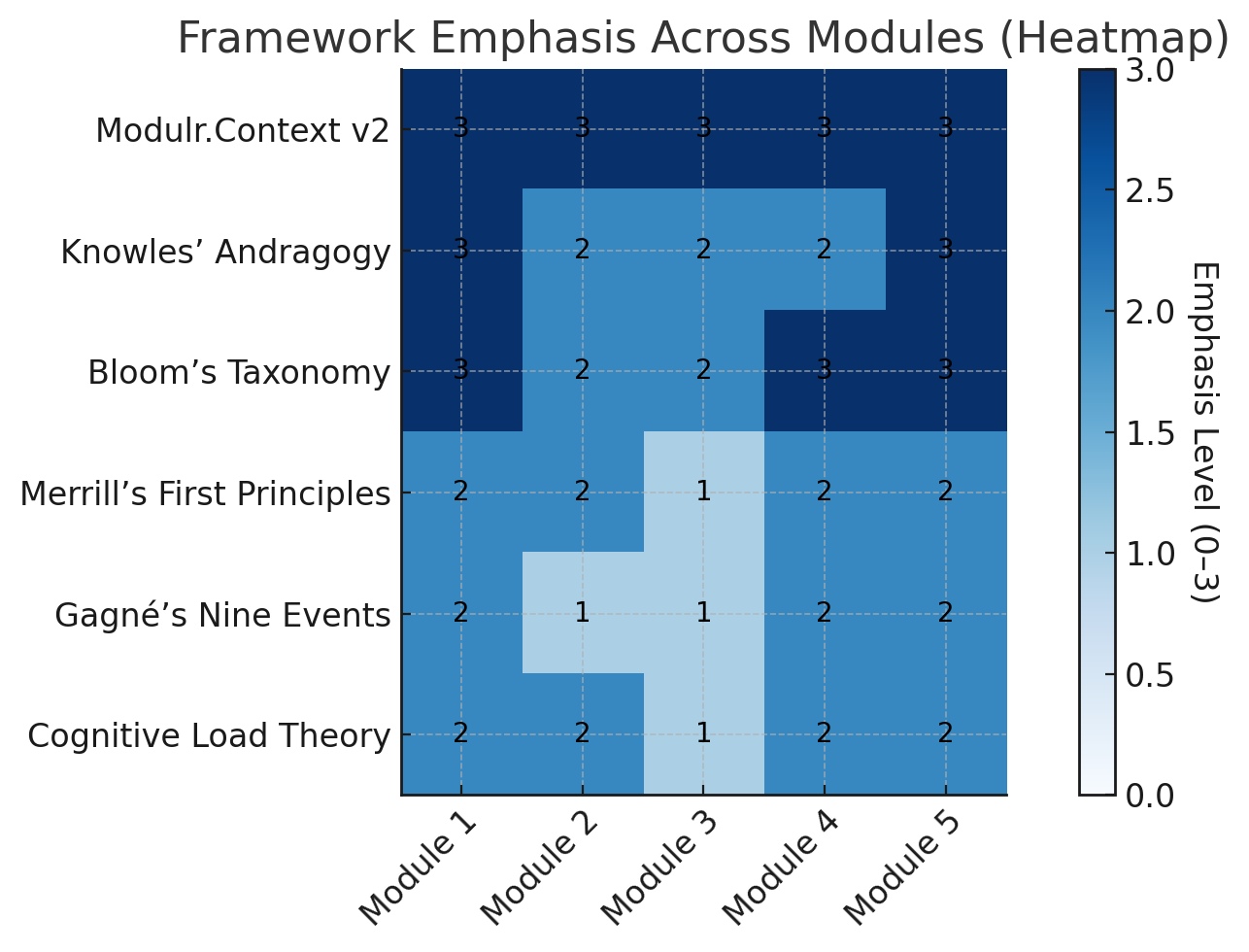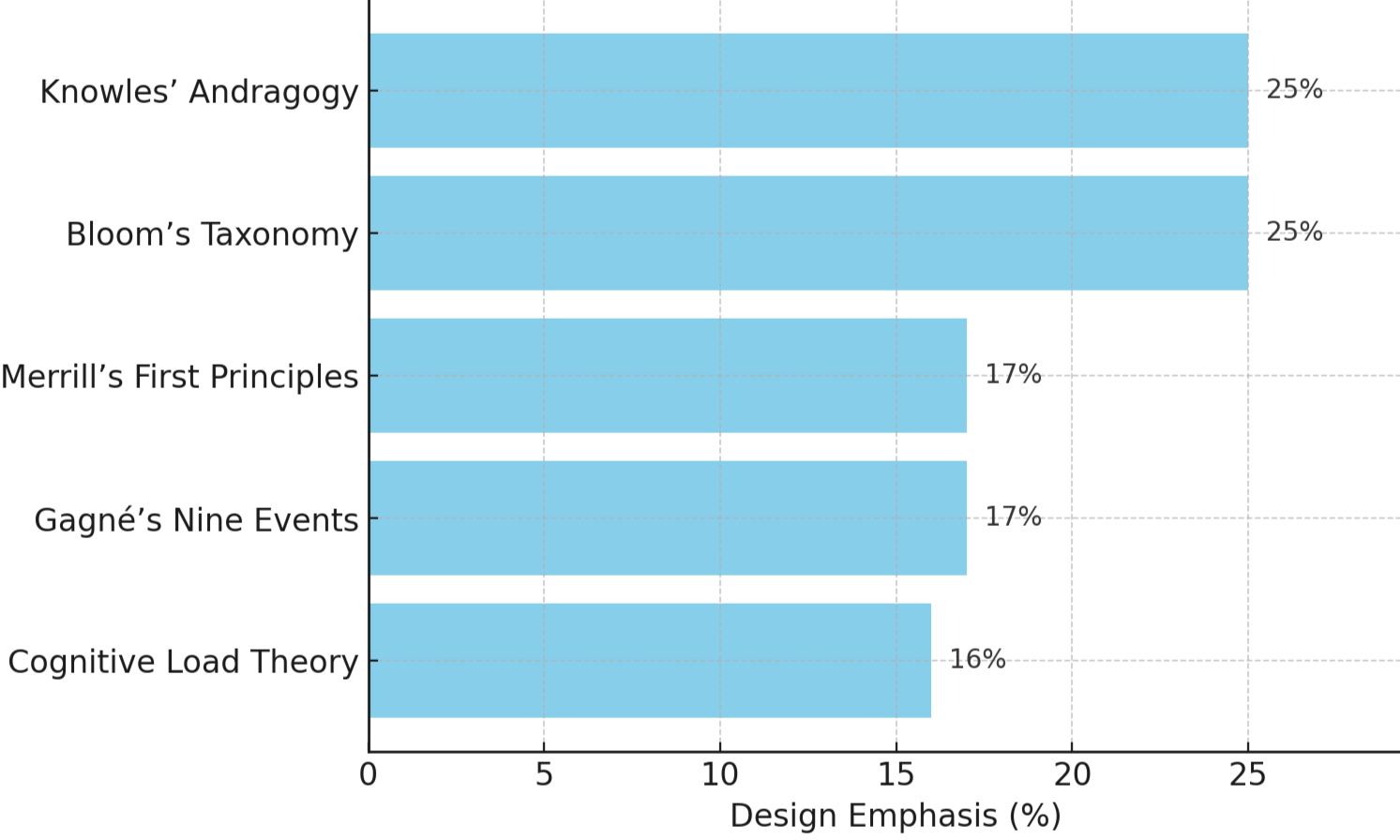Learning Systems That Learn — Visualizing Design Intelligence for Every Course
modulr.blueprint dashboard™
Course
Responsible AI Use in Client-Facing Work: Decision-Making for FutureTech Consultants
Organization
FutureTech Global
Status
Ready
DESIGN RATIONALE — WHAT DID WE PRIORITIZE AND WHY
content priority
Confidentiality & Compliance — Central to FutureTech’s risk posture; protects client trust and data integrity.
instructional priority
Scenario-based judgment under pressure — Builds decision confidence in realistic, high-stakes contexts.
design constraint
Hybrid, time-limited global teams — Required concise, mobile-optimized modules and reusable templates.— Quote Source
design drivers
Behavioral
Fear and uncertainty about what AI use is “compliant” or “safe.”
Overreliance on AI without fact-checking or review.
technical
Inconsistent tool use and lack of approved-tool knowledge.
operational
Tight client deadlines and hybrid, multi-region collaboration.
Limited budget for development; required modular reuse.
design overview
Audience
Consultants, project managers, and technical analysts with 3–7 years’ experience.
Operate in hybrid environments across New York, London, and Singapore.
Digitally fluent but new to structured AI governance; constrained by confidentiality and client timelines.
content
Mapped 100% to core content basis: Confidentiality, Tool Approval, Attribution, AI Governance, Literacy.
Tool Approval, Attribution, AI Governance, Literacy.
Five focused modules + two virtual workshops.
SME validation pending on policy excerpts, tool lists, and disclosure language.
objectives
Learners will:
Apply AI use policies in real deliverables.
Evaluate confidentiality and data risks.
Choose tools responsibly.
Attribute AI outputs transparently.
Balance speed and accuracy under pressure.
Objective → Module Map:
1–2 → M1 (Confidentiality)
3 → M2 (Tool Appropriateness)
4 → M3 (Attribution)
1,4 → M4 (Policy Application)
5 → M5 (Speed vs Accuracy)
Learning Frameworks
Across all five modules, Knowles and Bloom remain strongest, supporting authentic, high-stakes decision-making. Merrill, Gagné, and CLT appear at moderate intensity to structure practice and feedback. Modulr.Context anchors every judgment prompt in FutureTech’s operational reality, ensuring scenario relevance and policy linkage. Modules 3–5 slightly elevate Bloom-level evaluation and creation tasks through drafting and triage exercises.
Design emphasis distributes as follows — Knowles’ Andragogy 25%, Bloom’s Taxonomy 25%, Merrill’s First Principles 17%, Gagné’s Nine Events 17%, Cognitive Load Theory 16%. This blend emphasizes real-world autonomy, higher-order judgment, and clear task scaffolding within manageable cognitive load.
How This Course Differs from Generic Training
DESIGN Emphasis
Heavier on contextual realism situated in the work environment of FutureTech Global, including trade-off decision practice; lighter on generic procedural policy explanation.
Design Insights
Strength: Strongest performance in applied judgment and relevance to real work (Knowles, Bloom).
Gap: Pending SME inputs (policy excerpts, approval registry) increase extraneous load risk.
Action: Embed worked examples and final job aids before launch to strengthen Merrill/Gagné alignment.
Guidance: Facilitators should emphasize escalation and tool-approval pathways in workshops.
Module Highlights
M1 — Confidentiality under deadline; “segment-before-send” risk map.
M2 — Tool appropriateness; approval-first checklist for summarization tasks.
M3 — Attribution and transparency; human-in-loop quality review.
M4 — Governance in workflows; manager-focused memo and approval chain.
M5 — Speed vs accuracy; live triage under client pressure.
Downloads
next steps
Review → Approve → Build → Integrate into LMS.
Option: Request Dashboard Walkthrough for SME artifact alignment.
Team Rating (Pending): ⭐⭐⭐⭐☆
Final feedback summary to be added once implementation is complete.
Metadata and Footer
Generated By: Modulr.Outline v1.4.1
Based On: Modulr.Context v2 and Modulr.AI Behavioral Rules v1.2.5
Compliance Check: ✔ Tier 1 Behavioral Rules
Review Notes: [auto-filled or left blank]
Blueprint Version: 1.0


